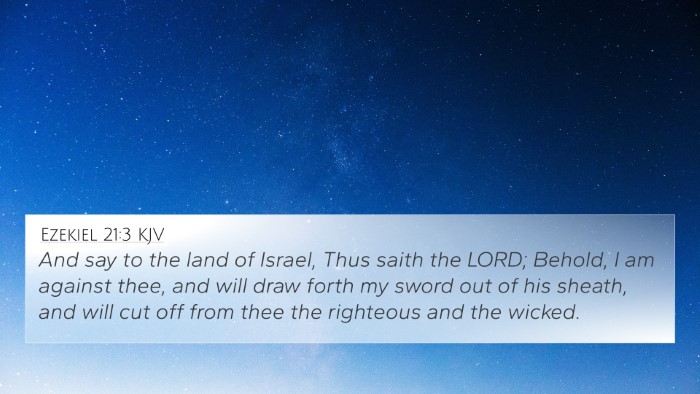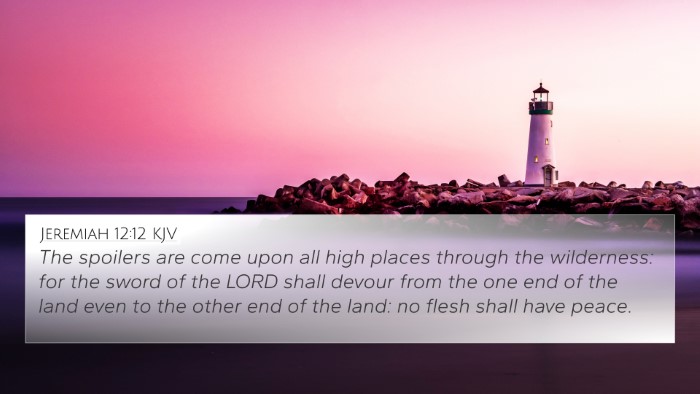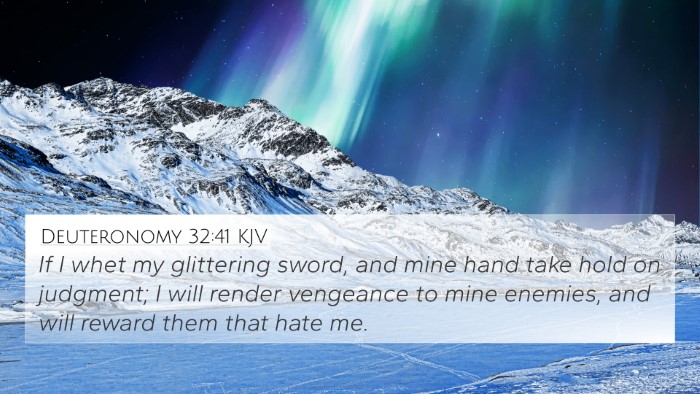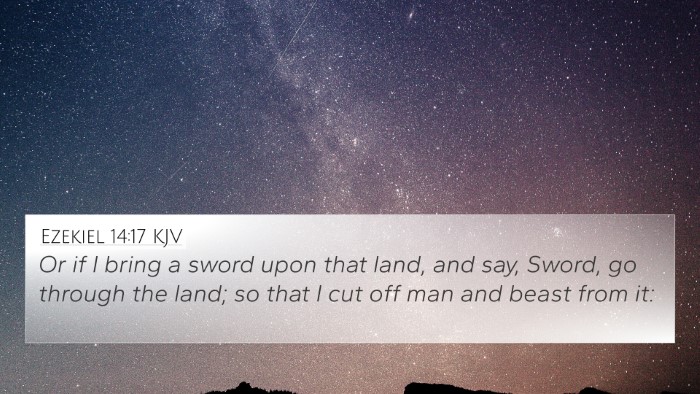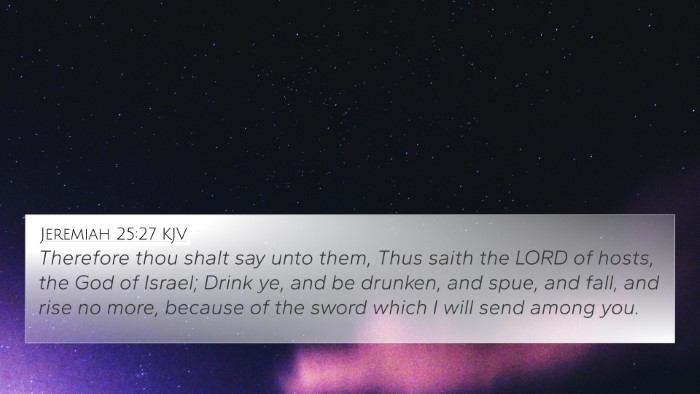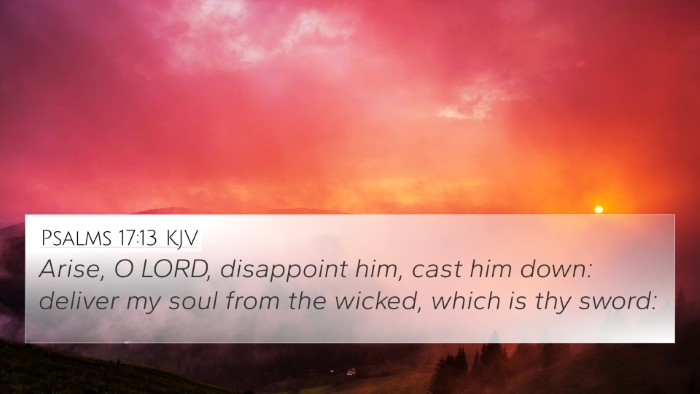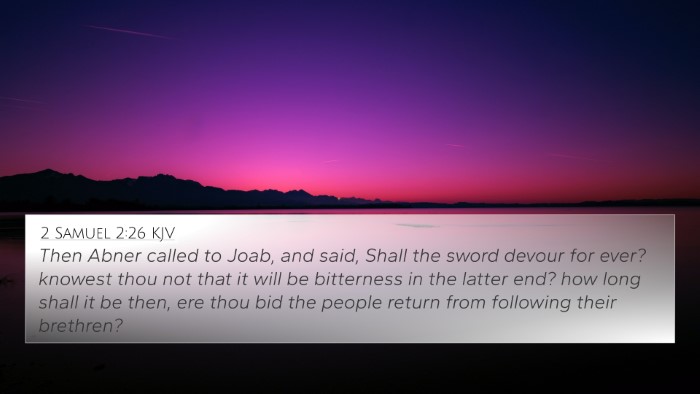Understanding Jeremiah 47:6
Jeremiah 47:6 states:
"O thou sword of the Lord, how long will it be ere thou be quiet? put up thyself into thy scabbard, rest, and be still."
Summary of the Verse
This verse portrays a dramatic appeal to the sword of the Lord, personifying it as an instrument of judgment. The speaker questions the duration of its destructive work and implores it to sheath itself and find rest. This reflects a deep concern about the overwhelming consequences of divine judgment upon the nations.
Thematic Insights
Major themes from this verse include:
- Divine Judgment: The sword as a symbol of God's judgment upon the nations.
- Intercession: The act of pleading for relief from ongoing judgment.
- Restoration: A yearning for peace and restoration following turmoil.
Commentary Insights
Matthew Henry's Commentary
Matthew Henry emphasizes that the sword of the Lord signifies God’s retributive justice. He sees this verse as a lament, indicating the pervasive destruction looming over the Philistines. Henry notes that this plea reflects humanity's deep desire for divine mercy amidst judgment.
Albert Barnes' Notes
Albert Barnes points out the implications of the sword being quieted. He interprets the verse as a request to postpone divine punishment, suggesting that even in the face of judgment, the people are calling for a moment of peace. Barnes clarifies that this acknowledgment of the sword's power underscores God’s authority over warfare and judgment.
Adam Clarke's Commentary
Adam Clarke highlights the symbolic representation of the sword, relating it to the calamities that were expected to befall the people. He emphasizes the relentless nature of divine retribution, noting that the inquiry signifies a heavy weight of grief and anticipation of turmoil that seems unending.
Connections Between Bible Verses
To gain a better understanding of Jeremiah 47:6, we can look at several Bible verses that present similar themes:
- Isaiah 1:20: "But if ye refuse and rebel, ye shall be devoured with the sword: for the mouth of the Lord hath spoken it."
- Ezekiel 21:9-10: "Son of man, prophesy, and say, Thus saith the Lord; Say, A sword, a sword is sharpened, and also furbished."
- Revelation 19:15: "And out of his mouth goeth a sharp sword, that with it he should smite the nations."
- Psalm 7:12: "If he turn not, he will whet his sword; he hath bent his bow, and made it ready."
- Matthew 10:34: "Think not that I am come to send peace on earth: I came not to send peace, but a sword."
- Jeremiah 46:10: "For this is the day of the Lord God of hosts, a day of vengeance, that he may avenge him of his adversaries."
- Luke 21:24: "And they shall fall by the edge of the sword, and shall be led away captive into all nations."
- Habakkuk 3:12: "Thou didst march through the land in indignation, thou didst thresh the heathen in anger."
Cross-Referencing Biblical Texts
Using tools for Bible cross-referencing can enhance understanding of the thematic connections in scripture. Multiple resources, including Bible concordances and Bible reference guides, can help identify these links. Here are a few ways to use cross-references effectively:
- Identifying Themes: Explore related verses that deal with judgment, warfare, and God’s authority.
- Asking Questions: Consider how Jeremiah 47:6 interacts with New Testament teachings on judgment and divine authority.
- Comparative Analysis: Look for parallels between the messages found in the prophetic books and the apostolic writings.
- Thematic Studies: Delve into chapters dealing with the significance of the sword in scripture.
Conclusion
Jeremiah 47:6 serves as a poignant reminder of God's sovereign power over the nations and human affairs. This verse not only expresses a cry for relief from judgment but also underscores the seriousness of divine retribution. By examining cross-references and engaging in comparative Bible verse analysis, readers can glean deeper insights and forge powerful connections between Biblical texts.
Further Exploration
To dive deeper into the intertwining narratives of Scripture, consider how other verses illuminate similar themes of divine judgment and mercy. The pursuit of cross-referenced themes will enrich your understanding of the Bible and offer glimpses into the overarching narrative of God’s relationship with humanity.



